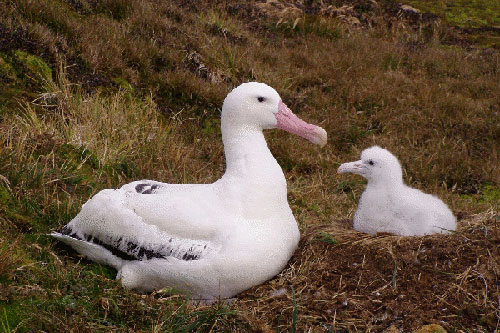Relatively little is known about how birds age. A 50-year old banded albatross looks just like a 25-year old to human eyes. No grey hairs, no missing teeth! In a paper recently published online in PNAS Vincent Lecomte of the CEBC and 10 co-authors address this problem for the Wandering Albatross Diomedea exulans. Banded albatrosses on Ile de la Possession, Crozets with an age range of 6-48 years were satellite-tracked at sea and their physiological parameters that have been associated with aging were measured.
It was found that age influenced both foraging behaviour and reproductive performance. Old males (>30 years) foraged farther south than did younger males, which did not cross the Antarctic Polar Front. Only males appear to modify their foraging strategy with age. No such differences were observed with females. Old males were less active on the sea surface and returned to land with elevated levels of stress hormone, suggesting a fall in foraging efficiency.

The next aging study in this species requires following changes in foraging and physiology in individual male Wanderers as they age: clearly a task for more than one generation of marine ornithologists!
Also visit http://www.physorg.com/news188587622.html for a review of the paper.
Reference:
Lecomte, V.J., Sorci, G., Cornet, S., Jaeger, A., Faivre, B., Arnoux, E., Gaillard, M., Trouvé, C., Besson, D., Chastel, O. & Weimerskirch, H. 2010. Patterns of aging in the long-lived Wandering Albatross. Proceedings of the National Academy of Sciences, of the United States of America. Published online doi: 10.1073/pnas.0911181107 http://www.pnas.org/content/early/2010/03/11/0911181107.full.pdf+html.
John Cooper, ACAP Information Officer, 4 April 2010

 English
English  Français
Français  Español
Español